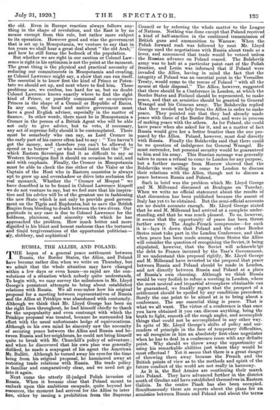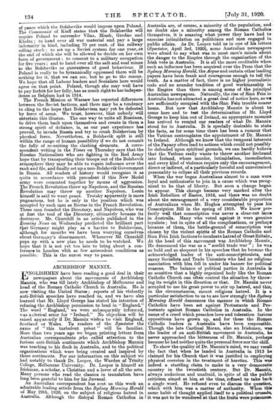RUSSIA, THE ALLIES, AND POLAND. T HE hopes of a general
peace settlement between Russia, the Border States, the Allies, and Poland have become rather dim when we write on Thursday, but we admit that the whole situation may have changed within a few days or even hours—so rapid are the con- volutions of a situation which nobody quite understands. To begin with, we may survey the milestones in Mr. Lloyd George's persistent attempts to bring about established relations with Russia. We all remember how his original proposal for a meeting between representatives of Russia and the Allies at Prinkipo was abandoned with contumely. Although we think that Mr. Lloyd George has been on the right lines throughout, he had himself chiefly to thank for the unpopularity and even contempt with which the Prinkipo proposal was treated, because he surrounded his effort with the usual unfortunate hedge of equivocations. Although in his own mind he sincerely saw the necessity of securing peace between the Allies and Russia and be- tween Russia and her neighbours, he could not bring himself quite to break with Mr. Churchill's policy of adventure ; and when he discovered that his own plan was generally disliked, he made a scapegoat of his agent the American Mr. Bullitt. Although he turned away his eyes for the time being from his original proposal, he hammered away at restoring trade relations with Russia. His trade policy is familiar and comparatively clear, and we need not go into it again. Next came the utterly ill-judged Polish invasion of Russia. When it became clear that Poland meant to embark upon this ambitious escapade, quite beyond her resources, the moment had arrived for the Allies to inter fere, either by issuing a prohibition from the Supreme Council or by referring the whole matter to the League of Nations. Nothing was done except that Poland received a kind of half-sanction in the continued transmission of British guns and ammunition to Warsaw. When the Polish forward rush was followed by rout Mr. Lloyd George used the negotiations with Russia about trade as a lever, and announced that trade would be vetoed unless the Russian advance on Poland ceased. The Bolshevik army was to halt at a particular point east of the Polish frontier, and Lenin was informed that if Poland were invaded the Allies, having in mind the fact that the integrity of Poland was an essential point in the Versailles Treaty, would come to the rescue of Poland " with all the means at their disposal." The Allies, however, suggested that there should be a Conference in London, at which the Border States and Finland should be represented, to make peace, and that an armistice should be granted to General Wrangel and his Crimean army. The Bolsheviks replied that they needed no help from the Allies in order to make peace. They pointed out that they had already made peace with three of the Border States, and were in process of making peace with the others. As for Poland, she could have peace when she asked for it, and as a matter of fact Russia would give her a better frontier than the one pro- posed by the Allies. Poland, however, must deal directly with Russia. Finally the Bolsheviks said that there could be no question of indulgence for General Wrangel. He must surrender, but personal security would be guaranteed to him and his army. This Russian message was generally taken to mean a refusal to come to London for any purpose, but a further message from Moscow showed that the Bolsheviks were willing to come to London to discuss their relations with the Allies, though not to discuss a peace between Russia and Poland.
Such in brief was the problem which Mr. Lloyd George and M. Millerand discussed at Boulogne on Tuesday. When we write no official statement about the results of that discussion has been published because the assent of Italy has yet to be obtained. But the semi-official accounts are no doubt accurate enough. Mr. Lloyd George stated that he and M. Millerand had arrived at a complete under- standing, and that he was much pleased. To us, however, it seems that the opportunity of peace has been thrust further away. The Anglo-French compromise—for such it is—lays it down that Poland and the other Border States must take part in the London Conference, and that When peace has been made among these States the Allies will consider the question of recognising the Soviet, it being stipulated, however, that the Soviet will acknowlefge the debt to France incurred by the Tsar's Government. If we understand this proposal rightly, Mr. Lloyd George and M. Millerand have reverted to the proposal that peace between Russia and Poland should be made in London, and not directly between Russia and Poland at a place of Russia's own choosing. Although we think Russia would be very foolish to refuse a meeting in London, where the most neutral and impartial atmosphere obtainable can be guaranteed, we frankly regret that the prospect of a settlement should be spoiled by any conditions precedent. Surely the one point to be aimed at is to bring about a conference. The one essential thing is peace. That is what we all want. The virtue of a conference is that once you have obtained it you can discuss anything, bring the truth to light, smooth off the rough angles, and accomplish things that could not be accomplished in any other way. In spite of Mr. Lloyd George's shifts of policy and sur- renders of principle in the face of temporary difficulties, we all recognize in him an absolutely first-class negotiator when he has to deal in a conference room with any definite point. Why should we throw away the opportunity of using his remarkable abilities just where they would be most effectual ? Yet it seems that there is a great danger of throwing them away because the French and the British points of view as to the methods and spirit of the future conduct of the world are not really in harmony. As it is, the Red Armies are continuing their march into Poland. They have advanced further in the district south of Grodno and have established themselves in Eastern Galicia. In the centre Pinsk has also been occupied. Simultaneously there are reports about the plans for an armistice between Russia and Poland and about the terms of peace which the Bolsheviks would impose upon Poland. The Communist of Kieft states that the Bolsheviks will require Poland to surrender Vilna, Minsk, Grodno and Kholnr ; to hand over all war material and pay a large indemnity in kind, including. 70 per cent. of the railway rolling stock ; to set up a Soviet system for one year, at the end of which she will be allowed to decide on her own form of government ; to consent to a military occupation for five years ; and to hand. over all the salt and coal mines to the Bolsheviks as guarantees of good behaviour. If Poland is really to be tyrannically oppressed there will be nothing for it, that we can see, but to go to the rescue. We hope that all Labour leaders and Socialists here would agree on that point. Poland, though she may well have to pay forfeit for her folly, has as much right to her indepen- dence as Belgium had in 1914. The French Mission at Warsaw has reported differences between the Soviet factions, and there may be a tendency to cling to the hope that Bolshevism may yet be defeated by force of arms. We trust, however, that nobody will entertain this illusion. The one way to unite all Russians, to drive them back upon themselves and create in them a strong spirit of defiance, is, as our past experience has proved, to invade Russia and try to crush Bolshevism by physical force. Nevertheless, a Bolshevik split is still within the range of human possibility if we do not commit the folly of re-uniting the clashing elements. A corre- spondent writing in the Times on Thursday says that the Russian Nationalists who are fighting in the Red Army hope that by transporting their troops out of the Bolshevik atmosphere they may be able to regain influence over the rank and file, and finally set up a non-Bolshevik Government in Russia. All readers of history would recognise it as quite in accordance with precedent if this New Model army were cemented together by means of aggression. The French Revolution threw up Napoleon, and the Russian Revolution may throw up another Napoleon. Lenin himself is said to want peace. Trotsky apparently is more pugnacious, but he is only in the position which was eccupied by such men as Barns in the French Revolution. These men founded the Directory, and Napoleon, who was at first the tool of the Directory, ultimately became its destroyer. Mr. Churchill in an article published in the 4vening News on Wednesday predicted the brilliant part that Germany might play as a barrier to Bolshevism, although for months we have been worrying ourselves. about Germany's disarmament. Whenever Mr. Churchill pops up with a new plan he needs to be watched. We hope that it is not yet too late to bring about a con- ference in London with as few antecedent conditions as possible.. This is the surest way to peace.



































 Previous page
Previous page